IVG’s “four bombs at one time” turned out to be plagiarism?
News on July 2. Recently, the founder of Happy Vibes said: IVG copied us. What is clear is that Happy Vibes’ related product, Twist, was released much earlier than IVG 2400. It said that IVG 2400 is not really “the first compliant large-mouth disposable”. It is reported that Happy Vibes will officially launch Twist on December 7, 2022. The press release clearly described the product characteristics of Twist: 4 different pods are built in, and the flavor can be switched by rotating, and it is emphasized that this is the first product to achieve this function under the premise of legal compliance: “This It’s just about export. The import of counterfeit products in the UK will also face the same risks, and the resolution will even be slower.” Happy Vibes analyzed: “In addition, relevant regulatory agencies have always encouraged innovation and attached great importance to intellectual property protection. Once “counterfeiting” If it is confirmed, it is very likely to have an impact on the license renewal of the licensed company, and the foundry company will definitely not lose the big because of small things.” According to Happy Vibes, the lawyers of Happy Vibes are making preliminary preparations, even if they do not follow In terms of intellectual property rights, plagiarized products may also be suspected of violating the Anti-Unfair Competition Law—in other words, it may be difficult for plagiarized products to be sold normally.
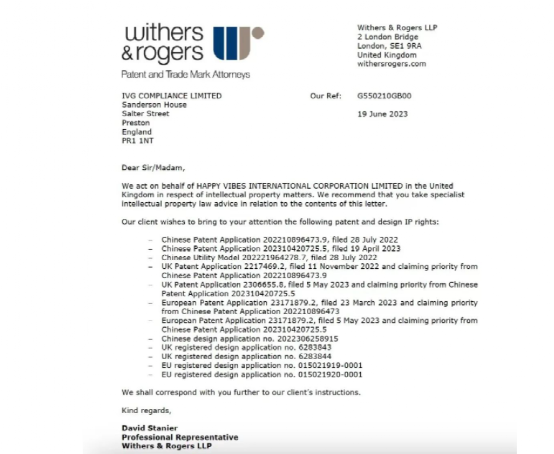
It is reported that Happy Vibes has applied for as many as 12 patents, including the core patent of “a rotatable electronic cigarette with multiple oil tanks”. According to Owen Guo, if you continue to use this rotating design, you must “step on the pit” like Happy Vibes, but the corresponding solutions have been patented. The ins and outs of “the UK’s first compliant 2,400-port disposable” are now clear
25,000 e-cigarettes disguised as “makeup products” were investigated in Turkey!
According to news on July 2, Turkish customs recently seized 25,000 smuggled e-cigarette products at Istanbul Sabiha Gokcen Airport, valued at 2.5 million Turkish liras

After preliminary investigation, it was learned that these products were marked as “makeup care products” when they were declared at customs, but the customs scan found that the boxes containing these products had suspicious density. During further inspections by customs, the boxes were found to be full of vaping products. Currently, relevant Turkish authorities are investigating the incident.
Belarus will implement the e-cigarette oil trade license system from July!
According to news on July 2, the Belarusian taxation and collection department revealed that from July 1, the sales of smokeless nicotine products and e-cigarette oil will need to obtain a license.
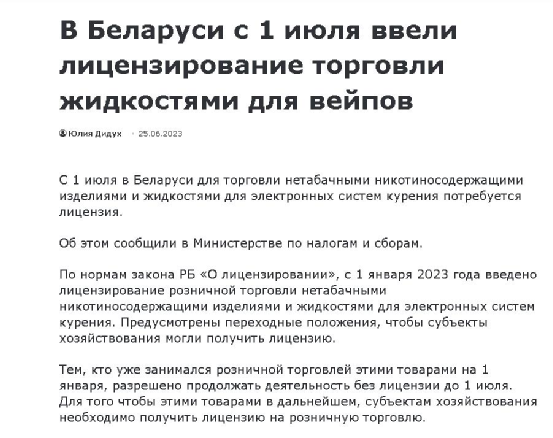
According to the “License Law” of Belarus, starting from January 1, 2023, the retail business of smokeless nicotine products and e-liquids will be required to be licensed. To ensure that operators are able to obtain a license, transitional provisions are in place to allow sufficient time for commercial entities to obtain a license. Those who were already retailing these items on January 1, 2023, can continue to do so without a permit until July 1. In order to continue selling these goods in the future, commercial entities need to obtain a retail trade license. Operators who already hold a license covering “retail sales of tobacco products” services and have sold smokeless nicotine products and e-liquids before 1 January 2023 can continue to do so. According to the transition period regulations, before July 1, 2023, operators must submit a notification of the MARТ form to the licensing authority in accordance with the regulations, and if they have not yet obtained a license, they must apply as soon as possible. The Belarusian tax and collection department emphasized that after July 1, operators who do not comply with the regulations will be prohibited from retailing smokeless nicotine products and e-liquids.
Australia’s illegal e-cigarettes are as high as 80%!
According to news on July 2, the recent four-day Global Forum on Nicotine 2023 (GFN23) was held at the Marriott Hotel in Warsaw, Poland. The theme of this forum was “Tobacco Harm Reduction – The Next Decade”. The forum attracted senior practitioners, scientists and scholars from international tobacco companies, well-known international universities, non-profit organizations and research institutions. As the official cooperative media of GFN23, Two Supremes participated in and reported on the important meeting agenda of the forum.

Australian GP and founder of MedicalNicotine, Dr Carolyn Beaumont, will speak at the 2023 Global Forum on Nicotine (GFN) to discuss the fallout from Australia’s ban on over-the-counter e-cigarettes. After Australia implemented the prescription e-cigarette system, it failed to ban the use of over-the-counter e-cigarettes. In youth-intensive venues, such as music festival venues, the illegal use of disposable e-cigarettes by young people is very serious. Beaumont pointed out: “E-cigarettes are everywhere at music festivals, mainly because of the participants and young people under the age of 21.” A group of people overwhelmingly buy disposable e-cigarettes on the black market, a trend that is soaring in Australia. Since the products are officially illegal, festival goers keep them during the event and discard them after the event to avoid detection by security. Despite the ban, the illegal vaping market in Australia is still thriving. Dr. Beaumont estimates that these illicit e-cigarettes account for 80% of all e-cigarette use, and almost 100% of them are used among young people.
Malaysian e-cigarette liquid lacks warning labels!
According to news on July 2, Malaysia lacks specific regulations and regulatory measures to control e-cigarette products, which is worrying. In Malaysia, e-cigarette liquids that can be purchased lack clear information on the nicotine content. Some products provide vague descriptions, omitting units such as mg, or providing numerical values without specifying their relationship to nicotine levels.
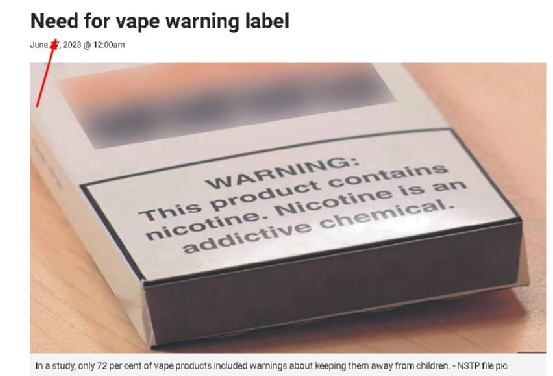
In addition, online merchants fail to clearly specify the nicotine content, and some sellers only display the value and label in the purchase option without specifying the nicotine strength. These circumstances highlight the potential health risks that failure to comply with regulations can pose to uninformed e-cigarette users, especially young people who may be unaware of the dangers of these substances.
Production of e-cigarettes without a corresponding license in Russia will impose a fine of one million rubles!
On July 2, according to INTERFAX.RU reports, the Russian State Duma Construction and Legislative Committee passed a series of bills aimed at strengthening the supervision of the circulation and production of tobacco and nicotine-containing products.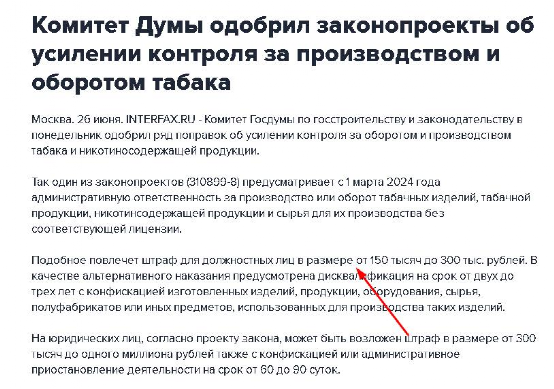
One of the bills (310899-8) stipulates that from March 1, 2024, the production or trading of tobacco products, tobacco products, nicotine-containing products and related raw materials without corresponding licenses will face administrative responsibility. The bill also stipulates that the person directly responsible will be punished, and the person in charge will be fined from 150,000 to 300,000 rubles. As an alternative punishment, it may also be deprived of its business qualification for 2 to 3 years and confiscated of produced products, commodities, equipment, raw materials, semi-finished products or other items used to manufacture the above products. According to the provisions of the law, for legal entities, a fine of 300,000 to 1 million rubles can be imposed, and at the same time their business activities can be suspended for 60 to 90 days. The bill also stipulates that administrative fines ranging from 3,000 to 5,000 rubles will be imposed on individuals for major technical equipment used in the production of tobacco products, tobacco products, nicotine-containing products and related raw materials that are not registered under the procedures established by Russian law and Confiscation of major technical equipment; For staff, the range of fines is 20,000 to 50,000 rubles, and related equipment will be confiscated; for legal entities, the range of fines will be 100,000 to 150,000 rubles, and related equipment will be confiscated. In addition, the committee passed a bill (310855-8) on Monday to regulate the production, supply, procurement, storage of tobacco products, nicotine-containing products and related raw materials without corresponding licenses on a large scale will face criminal responsibility. Violations are punishable by a fine of between 500,000 and 1 million rubles, or imprisonment for up to three years, according to the bill.
Canada requires manufacturers to publish half-year sales data of e-cigarettes!
According to news on July 2, the Canadian government recently announced the “E-cigarette Product Reporting Regulations”, requiring manufacturers to disclose information about the sales and ingredients of their e-cigarette products to Health Canada.
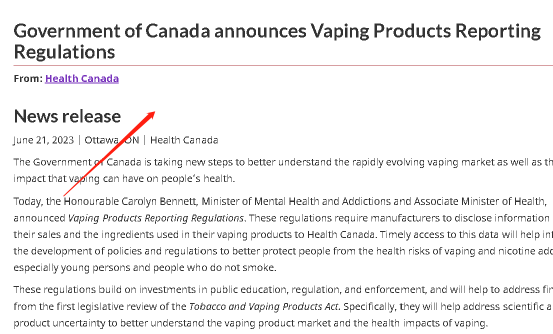
Regulations come into force from the date of registration. Manufacturers of vaping products must submit their initial sales reports within one month of the first full semi-annual reporting period after the regulation takes effect. For example, if registration is made in June 2023, the first full semi-annual cycle will run from July 1 to December 31, 2023, and sales reports must be filed on or before January 31, 2024. After the initial report, sales reports must be submitted semi-annually and must be submitted on or before the last day of the month following each semi-annual cycle. Any manufacturer who contravenes subsection 7.3(1) of the Tobacco and Vaping Products Act commits an offense and is liable on summary conviction to a fine not exceeding $50,000 or to imprisonment for a term not exceeding six months, or both place. It means that Canada will have a “reporting” system for e-cigarettes in the future. At present, Canada has also increased the control of e-cigarettes, such as prohibiting the promotion of e-cigarette products where young people can see them, requiring warnings about the risks of e-cigarettes to be displayed on advertisements and packaging labels, and limiting the concentration of nicotine in e-cigarette products. The second legislative review of the Tobacco and Vaping Products Act is underway.
British American Tobacco spends 4 billion to set up an electronic cigarette innovation center in Italy!
On July 2, according to news from the official website of British American Tobacco (BAT), BAT’s innovation center in Trieste, Italy officially opened. It is reported that the innovation center cost 500 million euros (approximately RMB 4 billion), with laboratories, production offices, technical rooms and 12 new product production lines inside, and it took five years to complete.
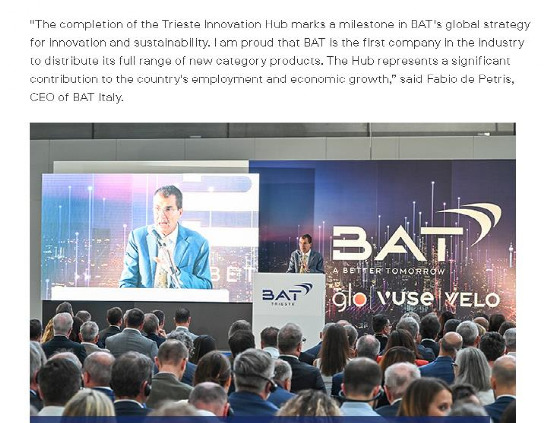
According to reports, the innovation center was completed within 21 months and was designed according to the latest sustainability standards. It runs on 100% renewable energy and plans to be certified carbon neutral by early 2024. The center houses a digital boutique and an innovation lab focused on digital transformation, sustainable development, and open innovation; photovoltaic arrays and bioelectric power plants will provide most of the sex vendor purchases. According to BAT estimates, the innovation center will create 2,700 jobs, including 600 direct jobs and 2,100 indirect jobs. BAT Italy already works with around 400 agricultural supply chain companies and employs more than 6,000 people. Fabio de Petris, CEO of British American Tobacco Italy, said: “The completion of the Trieste Innovation Center marks an important milestone in BAT’s global innovation and sustainable development strategy. BAT is proud to be the first in the industry to introduce its full line of new products.”
The ban on e-cigarette flavors in the Netherlands has been postponed again!
According to news on July 2, the Dutch government decided to postpone the implementation of the ban on e-cigarette flavors again. The ban will take effect on January 1, 2024. Previously, the Dutch government planned to ban all e-cigarette flavors except tobacco from October 1, 2023, and the time has now been set three months later than originally planned.

The ever-extending “taste ban”. The Dutch “taste ban” was announced as early as 2021. At that time, the government planned to officially implement it on July 1, 2022, but by June 2022, a government spokesperson said that some troubles were encountered when implementing the taste ban. Additional checks are necessary to determine if the flavoring ingredients used are actually safe. Therefore, the time was postponed to January 1, 2023, and a 10-month window period (officially implemented on October 1) was set aside for the tobacco industry to digest existing flavored tobacco products.
2.2 million users of Brazilian e-cigarettes are not far away? !
According to news on July 2, the Brazilian National Health Surveillance Agency (Anvisa) plans to start a public consultation on e-cigarette regulation in the second half of this year, which may mean that e-cigarettes are in the legal process. At present, Brazil prohibits the sale, import and distribution of e-cigarettes, and those who violate the regulations may face fines of up to 1.5 million reais (about 2.25 million yuan). During the public consultation period, social and economic actors involved in the issue will have time to submit comments, suggestions and criticisms to the agency.

It is reported that the survey results of the research institution Ipec show that the number of e-cigarette users in Brazil has increased from 500,000 to 2.2 million. In the capital Brasilia, 4% of the population has used e-cigarettes. BAT said that it has plans to expand the factory to accommodate the production of e-cigarettes. In the initial stage, imported components will be used for e-cigarette assembly; PMI representatives said that if the Brazilian National Health Supervision Bureau lifts the ban on e-cigarettes and heat-not-burn products, then PMI will A new plant will be planned in Rio Grande do Sul (a city in southern Brazil).
Vietnam compulsorily destroys more than 5,000 e-cigarettes!
According to news on July 2, it was recently reported that from January to June 2023, a total of 39 violations related to e-cigarettes were seized in Ho Chi Minh City, Vietnam, and a total of 634 million VND (about 195,000 yuan) was fined. 5,043 pieces of accessories were seized, 5,403 pieces of products and accessories were seized, and the total value of goods seized from unknown sources exceeded 974 million VND .
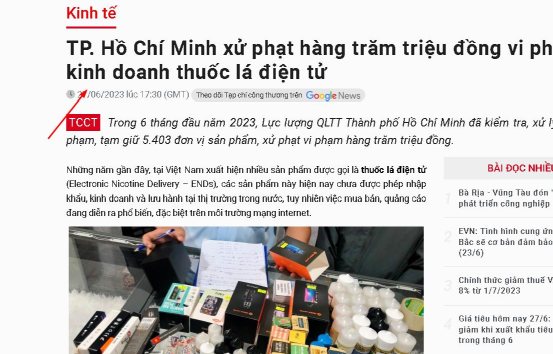
According to the photos provided by the report, the seized products involved SMOK, GEEK VAPE, VOOPOO, etc.
The number of e-cigarette brands that can be purchased in the United States has doubled!
The number of e-cigarette devices on the U.S. market has nearly doubled to more than 9,000 since 2020, according to sales data obtained by The Associated Press. This growth is mainly driven by disposable e-cigarettes that are not authorized by the FDA.

Most disposable vaping products are associated with the mainstream brands on the market, but hundreds of new products hit the market every month. Companies copy designs from each other, blurring the lines between genuine and counterfeit products. Brand owners only need to send their brand logo and taste requirements to Chinese manufacturers, and they can launch new products within a few weeks. According to IRI data, (2022), the US e-cigarette retail market is about $7 billion, and disposable e-cigarettes account for about 40%. IRI conducts proprietary data analysis by collecting barcode scanner sales data from convenience stores, gas stations and other retailers. There are now more than 5,800 unique disposable e-cigarette products on the market, sold in a variety of flavors and formulations, a 1,500% increase from 365 in early 2020, the data showed. At the time, the FDA effectively banned all flavors of pod-filled e-cigarettes except menthol and tobacco, such as JUUL, which has been blamed for sparking a nationwide surge in underage vaping. Further insight is provided by IRI data, which shows that the number of e-cigarette brands in the US has grown by nearly 50% to 269 by the end of 2022.
Since July, Kyrgyzstan will ban the circulation of electronic cigarettes and HNB without tax labels!
According to the news on July 2, the Kyrgyz State Taxation Bureau recently issued a statement stating that according to the cabinet resolution on February 22, 2022, starting from July 1, 2023, the Kyrgyz State Taxation Bureau prohibits the circulation of goods that are not marked with consumption tax.
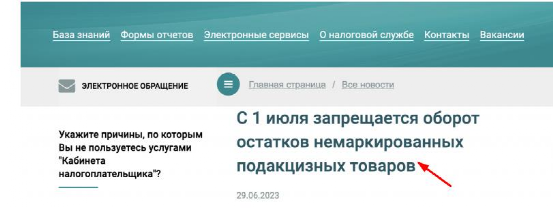
The following goods that are not marked with consumption tax will be prohibited from circulation: beer classified as goods code HS 2203 (bulk and packaged); nicotine-containing e-liquid (HS 2404) placed in electronic cigarettes; disposable e-cigarettes HS 2404); electronic cigarettes and similar personal vaping devices for the delivery of nicotine (HS 8543 40 0000); heatable tobacco products (HS 2404). For goods that are not marked but need to be marked, during the process of production, importation, introduction, storage and sale, if the excise mark or identification mark is not printed on the goods and/or packaging, or the regulations on the use of identification marks are violated and/or rules, but does not constitute a crime, a fine will be imposed. According to the Code of Offenses, individuals will be fined 20,000 som (approximately RMB 1,660), and legal persons will be fined 65,000 som (approximately RMB 5,400). Therefore, the Kyrgyz State Tax Service reminds everyone that products must be marked in a timely manner in accordance with the above-mentioned Cabinet resolution.
The UK found a large number of mouths and confiscated them immediately!
According to news on July 2, the British Customs and the British Medicines and Health Products Administration (MHRA) have recently conducted a strict investigation of large-volume e-cigarette products at Heathrow Airport (LHR Airport). The insider said, “The inspection is very strict. If it is found, it will be confiscated immediately, and there is no chance to respond.” According to him, in March this year, MHRA and customs conducted a joint law enforcement at LHR Airport, and many products were seized.

According to previous reports, in the past three years, trading standards departments across the UK have seized more than 2.5 million illegal e-cigarettes. In the city of Hillingdon, near Heathrow Airport (an important port of entry for illegal transactions), law enforcement officers have seized more than 1.35 million e-cigarettes, and this area has been the focus of law enforcement agencies. According to British law, only disposable e-cigarettes with a capacity of 2 milliliters (about 600 puffs) are allowed to be sold on the market, and any behavior exceeding this limit is illegal.
Ireland may increase the fee for e-cigarette licenses by at least 10 times!
News on July 2, according to irishexaminer, Irish Minister of Health Stephen Donnelly is considering setting a license fee of 500 euros per year for each e-cigarette retail store. That means vape retailers with multiple storefronts in the country face paying thousands of euros a year.

However, under the current tobacco retailer system, the one-time registration fee is only 50 euros, and retailers can operate an unlimited number of e-cigarette retail stores during any period of time. The new licensing system is expected to be implemented this fall. Also, in addition to the price hike, permits can only be issued to owners who have been operating at the venue for at least 12 months, a move the government hopes will lead to a clampdown on temporary stalls. The move would ban the sale of tobacco products and e-cigarettes at the festival, as well as vending machines.
The President of Kazakhstan stated that he will take measures to crack down on electronic cigarettes!
News on July 2, the President of Kazakhstan Kasym Zhomart Tokayev (Kasym Zhomart Tokayev) recently talked about the use of electronic cigarettes by young Kazakhs at a national meeting.

Tokayev emphasized that e-cigarettes have already posed a “threat” to young people, and Kazakhstan needs to take urgent and systematic measures to combat this dangerous phenomenon. “Another disaster that poses a threat to the health of our nation is the so-called e-cigarette and various types of e-cigarettes. These e-cigarettes have become popular among teenagers. This is mainly because they are widely available and advertised as Harmless. “We need urgent systemic measures to combat this dangerous phenomenon, and bans alone will not help. ”
The US electronic cigarette product report “headphone” will be investigated!
According to news on July 2, the U.S. Customs and Border Protection (CBP) is currently investigating e-cigarette freight forwarders in Los Angeles, and has intercepted hundreds of tons of e-cigarette products.
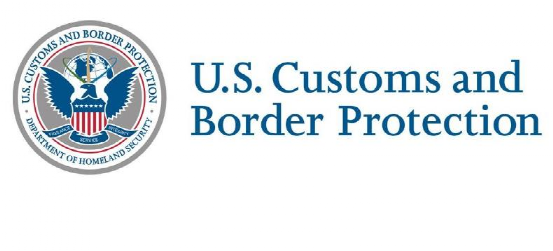
A person familiar with the matter received an update on the matter. It revealed that the inspection is still in progress, and some of the intercepted products have been released after submitting declarations and paying taxes, while the more serious cases are still waiting for customs inspection. The insider said that more serious situations include concealment and underreporting, such as the reporting of “earphones” for e-cigarette products, or “zero-tariff” products, which are found to require fines and heavy taxes. According to the insider, many domestic freight forwarders have stopped flying to Los Angeles this week.
India adds e-cigarette ban restrictions!
According to news on July 2, although India has recently issued a ban on e-cigarettes in 2019, e-cigarettes are still easy to buy online and in tobacco shops. Recently, the Indian Ministry of Health issued an announcement requiring stricter enforcement of the bill prohibiting the production, sale and promotion of e-cigarettes.
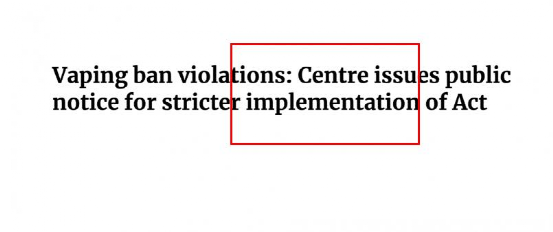
Additional prohibition restrictions. India’s Ban on Vaping (Production, Manufacture, Import, Export, Transport, Sale, Distribution, Storage and Advertising) Act came into force in 2019. The Ministry of Health has directed all producers, manufacturers, importers and other businesses not to directly or indirectly produce, manufacture, import, export, transport, sell, distribute or store e-cigarettes, whether they are complete products or any part thereof. In the recent notice issued by the Ministry of Health, it also requires companies in all links not to advertise for e-cigarettes, or participate in advertisements that directly or indirectly promote the use of e-cigarettes. The ministry added in the announcement that violations of production, manufacture, import, export, transportation, sale (including online sales), distribution, storage and advertising of e-cigarettes are identifiable and will be punished under the statutory provisions of the Act. punishment.
Russian e-cigarette laws are moving from enactment to implementation!
According to news on July 2, the 26th “St. Petersburg International Economic Forum” was recently held at the St. Petersburg International Convention and Exhibition Center in Russia. Discuss the regulatory direction, future challenges and solutions of Russia’s tobacco and alcohol industry. Sergey Katasonov emphasized that a major focus of the current tobacco market is new nicotine products, especially electronic cigarette products. Currently 90% of e-cigarettes on the Russian market are illegal products. He believes that the key to cracking down on illegal nicotine products is to strengthen regulatory measures.

He also mentioned the necessity of unifying tobacco excise tax rates, and emphasized that countries should maintain the stability of tobacco tax rates. For example, if Russia increases tobacco excise tax rates, other countries should adjust their tax rates accordingly; An increase in the tax rate to keep the tax rate stable at 13%. Oleg Balvin, general manager of British American Tobacco (BAT) in Russia, suggested that the government should first list tobacco as a national strategic material and implement a tracking and navigation system to prevent the illegal entry of illegal products; secondly, the retail network should be included in the supervision and take corresponding measures Regulatory measures to prevent offline retail stores from “bypassing” national laws and regulations and continuing to sell illegal products.
